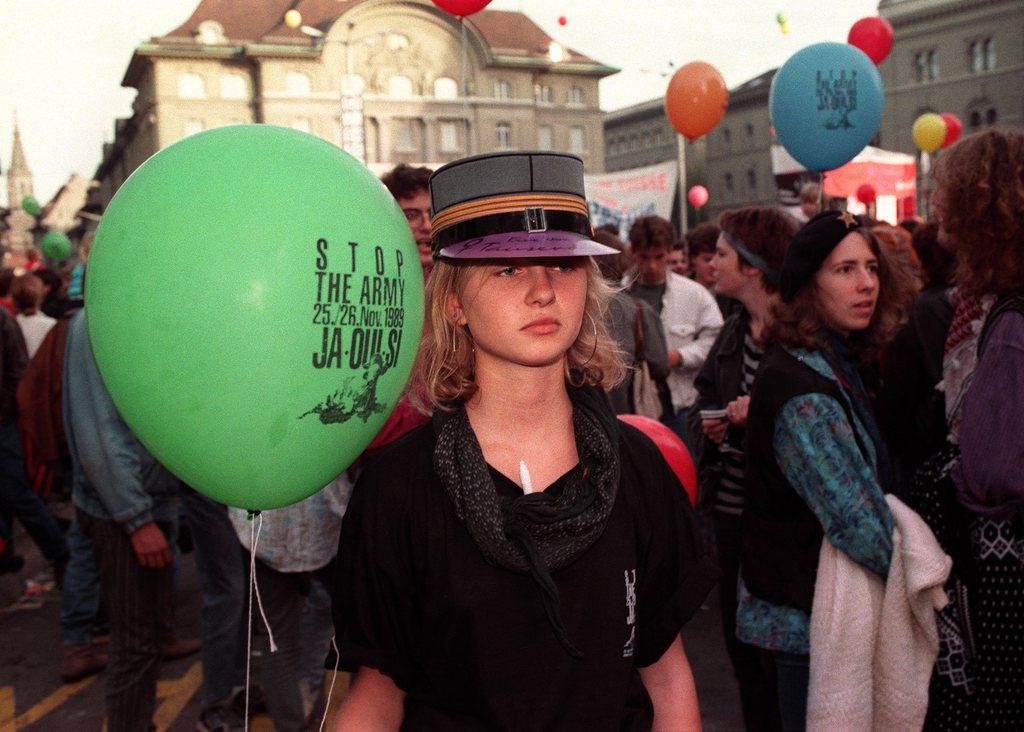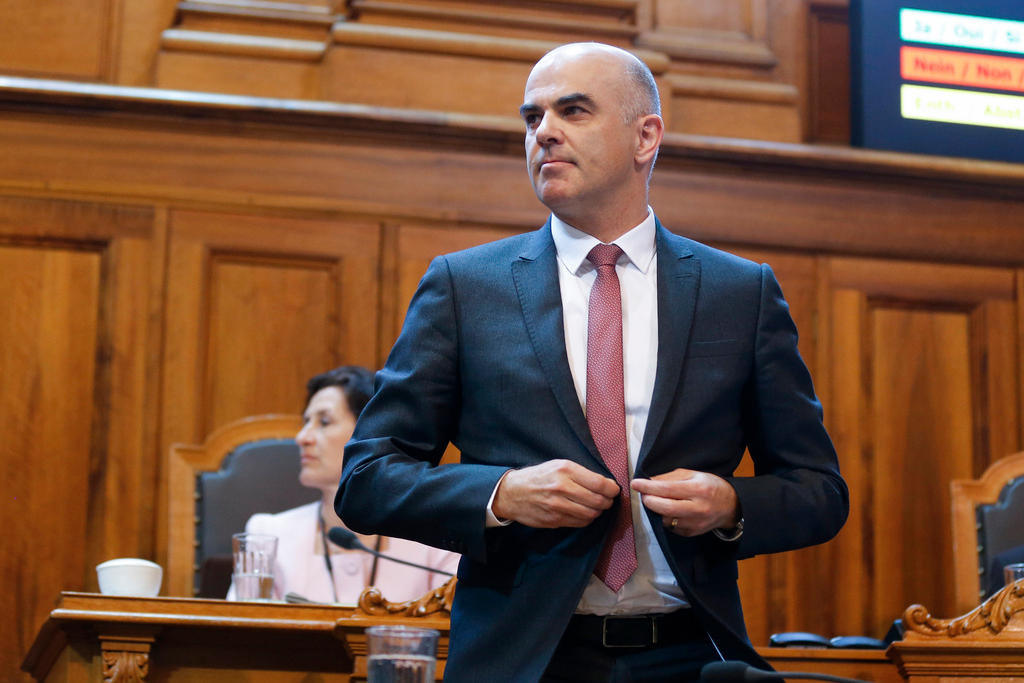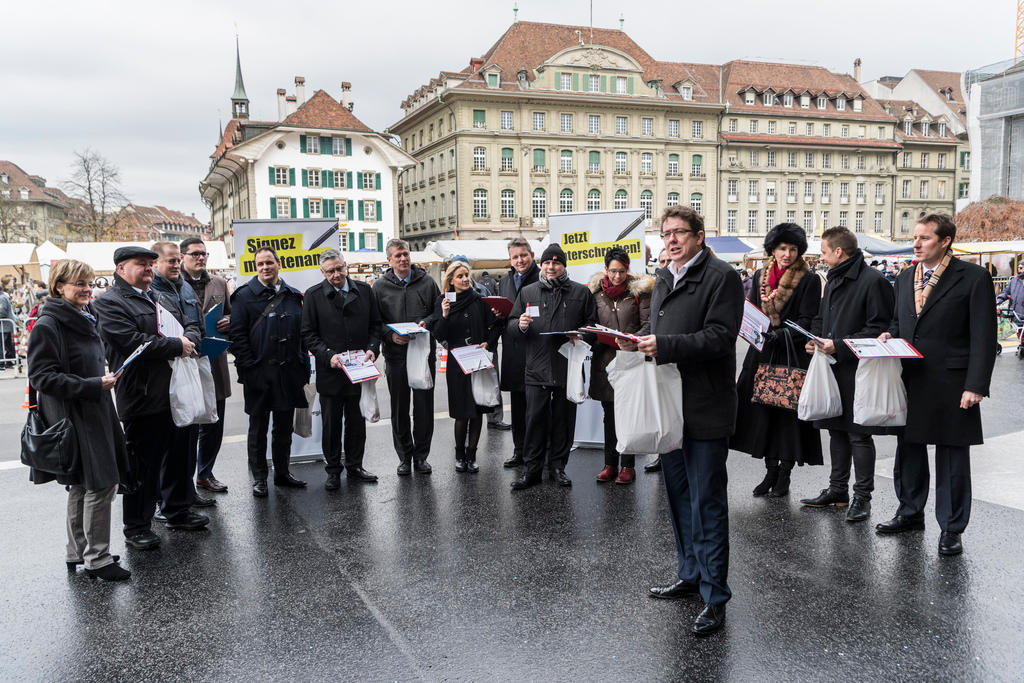Threat of referendum ‘sword’ keeps politicians in check

It’s the people who have the final say in Swiss politics, be it for constitutional amendments or for new laws. This veto is a crucial pillar of Switzerland’s Swiss political system.
This “pledge” in the hands of voters may be tedious for politicians and make the legislative process more complex. But as a permanent threat, it provides sustainable and broad-based solutions.
A popular anecdote may be useful to understand the importance of the referendum tool in direct democracy and help illustrate the situation when voters threw out a reform of the old age pension scheme last year.
A mountain farmer in a remote region of the country is asked about his voting behaviour. He replies: “I always vote no – and have fared well with it so far.”
Switzerland is an indirect democracy. But its direct democracy mechanisms are stronger than those of any other jurisdiction. This is shown by the nearly 620 nationwide votesExternal link.
Lukas Leuzinger analyses the most important tools, mechanisms and processes of direct democracy in Switzerland.
Leuzinger studied political science at the University of Zurich. He is a journalist and a co-operator of the political blog Napoleon’s NightmareExternal link.
The urgent reform had won approval in parliament, even if only with a tiny majority: a single vote made the difference. Still voters overturned the decision a few months later in a nationwide ballot.
Back to the start
It is not clear whether those who, like the mountain farmer, voted No on principle, were decisive for the failure of the bill.
But it shows that the Swiss system of direct democracy requires patience from politicians.
It is not enough to convince the government or the parties in parliament for a proposal. Proponents of an issue always have the voters in the back of their minds.
They can challenge and sink a project if not convinced of it – as was the case with the above- mentioned pension reform. The No vote at the ballot box swept away with one blow seven years of work in parliament.
Constant decisions
There are two types of referendums in Switzerland: either they are compulsory or optional.

More
What’s a referendum?
Constitutional amendments and membership of international organisations are subject to the mandatory referendum. That is, these matters must be submitted to voters for a final decision.
Laws as well as certain decisions and international treaties are subject to an optional referendum. They are put to a vote if at least 50,000 signatures are collected from citizens within 100 days.
The institution of the referendum is more than an additional opportunity for voters to have their say. It has a significant impact on the legislative process.
It forces politicians to forge alliances and use clever tactics in parliament to help a cause achieve a breakthrough. They must also consider whether a solution can win a majority of voters.
In a bid to achieve this goal, a public discussion is launched where those voices are also heard that are not represented in parliament.
More laborious, but sustainable
This additional hurdle slows down legislation and makes it more complicated. Decisions taken by a majority of voters are relatively consistent. They are not immediately overturned as is often the case when there is a change in government, for example.
#Dear Democracy
This text is part of #DearDemocracy, a platform on direct democracy issues, by swissinfo.ch. The views expressed in this article are solely those of the author, and do not necessarily reflect the views of swissinfo.ch.
Since the foundation of modern-day Switzerland in 1848, more than 200 bills have been subject to mandatory voting. More than three quarters of these were approved.
Introduced in 1874, the optional referendum has been applied in a total of 2,459 legislative amendments previously adopted by parliament. Opponents managed to collect enough signatures for a referendum in 177 cases. But the proposed law was only thrown out in 78 cases.
In other words, most bills and proposals decided by parliament enter into force without a referendum; and when there is a vote, the electorate follows parliament in most cases.
Preventive effect
However, the impact of the referendum right is not limited to the proposals that are put to the vote.
After all, even the prospect of a referendum often leads to the parliamentary majority seeking a compromise with potential opponents. Either to stop them from launching the referendum. Or to limit the number of No votes in a ballot.
In the case of the pension reform, this proved to turn into a tightrope walk for the centre-left majority in parliament.
The bill was opposed by both the right and the far left:
The conservative right Swiss People’s Party and the centre-right Radicals campaigned against the pension reform. They argued the finances of the pension system would deteriorate with the planned the CHF70 ($70) increase in monthly benefits.
The opposition from the far left was aimed at preventing plans to raise the retirement age of women from 64 to 65 years – in line with that of men.
It will not be easy to prepare a new reform proposal that will stand up to the people. But the example of the energy law, approved by voters in May 2017, shows that this is feasible. The bill, which foresaw the gradual withdrawal from nuclear energy and the promotion of renewable energy sources, met with scepticism among both centrist and rightwing parties.
Holding in check
During discussions in parliament, the left and centre parties partly came some way to meeting the demands of the business community, for example by agreeing additional funds for energy-efficient building renovations.
This was not enough for the People’s Party which decided to challenge the law in a referendum. A majority of the Radicals, however, backed the legislation. This was a key element for the law to win a comfortable majority in the popular vote.
The right of referendum is a constant political threat, not unlike the sword of Damocles. It works without the need to use it. Ultimately, direct democracy thus allows voters to exercise additional control over elected politicians.
The fact that the confidence of Swiss citizens in democratic institutions is higher than in other countries is probably largely due to it.
It is one thing to have trust in political institutions, but it is easier for the people to trust government and parliament if they can be held in check by a veto threat.
Adpated from German/urs

In compliance with the JTI standards
More: SWI swissinfo.ch certified by the Journalism Trust Initiative














You can find an overview of ongoing debates with our journalists here . Please join us!
If you want to start a conversation about a topic raised in this article or want to report factual errors, email us at english@swissinfo.ch.